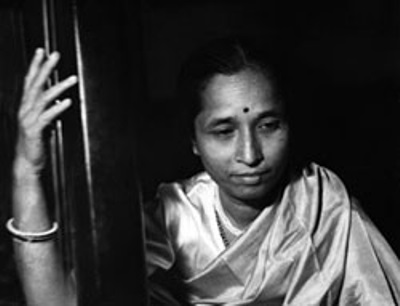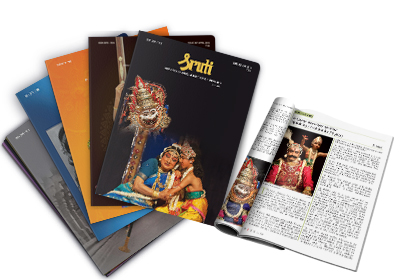
You mention the name ‘Gangubai Hangal’ and every musician bows his head in reverence. For people in Hubli, her home in Deshpande Nagar was the virtual centre of the city. Her home and heart was open to everyone and she was called ‘Ajji’ (grandmother) by all. Just about a year ago, after her 96th birthday, I met and interviewed her in Hubli for Radio Gandharv, the 24-hour Hindustani classical music station on WorldSpace Satellite Radio. The news of her death on 21st July brought back a kaleidoscope of memories for me—the disarming warmth of her smile, her child-like enthusiasm, and the refrain of her famous bandish in raga Jogiya Hari ka bhed na payo.
Her memories spanned the three octaves of music history, taking you into a grand narrative of Hindustani classical music. She reminisced about her camaraderie with guru-bhai Bhimsen Joshi when he used to accompany her to the station after the day’s lesson in their younger days, and she laughed about winning a card gameagainst Kumar Gandharva. Her eyes brimmed with tears while remembering her dear daughter Krishna who was her constant shadow. She waved away all questions about her struggles with a smile. It was an intense, enriching experience as Gangubai Hangal went down memory lane.
How did your musical journey start?
My mother was a Carnatic musician. I used to listen to her. On my way back from school, I used to stop at a small shop where they played gramophone records. I would stand there and listen to Hindustani music A bandish I still remember from those days is Radha bolo mukh se. I was enchanted by Hindustani music and started singing lines from those compositions. Noticing this, my mother decided that I should learn Hindustani music. To find the right guru for me,she sold our house in Dharwad and we shifted to Hubli. I was only twelve then.
Didn’t you ever ask your mother to teach you Carnatic music?
Of course I did. She taught me a few kriti-s, but told me I was too young to learn both Carnatic and Hindustani music. She said, “You don’t have the wisdom right now to keep the two styles apart. If you learn both, you’ll make a khichdi of it!’” She stopped singing Carnatic music so that my talim in Hindustani would not get affected. She did a lot for me. She was so young when she died, only 35. She had an operation and her stitches broke. She was there through our tough times but she didn’t live to see all that I achieved.
You were quite young when you sang at a Congress session in Belgaum in the 1920s. Yes, it was in 1923, I think. A group of us students were taught an invocatory song at school and taken to the session. Mahatma Gandhi was sitting in front of us.
At that time there were many restrictions and prejudices regarding caste. Being from a lower caste did you feel scared?
Yes I was apprehensive that after the song at the Congress session they would send me separately out to lunch. But thankfully that didn’t happen and I ate with everyone. Often in school I would hide when teachers passed by because I thought they would tell me to sit separately. My friends would ask ‘Gangu, what happened? Why are you hiding?’ I would say I don’t want to be sent outside!
You travelled a long distance to go to your guru Pandit Sawai Gandharva’s place from Hubli to Kundgol?
Yes, I had to travel everyday by train to his village in Kundgol. I would take the morning train at 5.30 and return by the last train at 9.30 pm.
What was his method of teaching?
He would make us work on one raga, one bandish till he was satisfied we were doing it properly. He would teach us and tell us to practise the taan-s and palta-s and go into the next room, but he would be listening from his room. I was often in tears because it was so tiring to repeat the same phrases again and again, but he would allow me to stop only when he thought I had learnt it properly.
Bhimsen Joshi and you learnt together. What are your memories of that time?
Bhimsen used to live at Guruji’s place in Kundgol. He learnt music and did all the housework. There was a water problem in the area and he would go to the well to fetch water for Guruji’s use. He would ask me to get a bigger pitcher for him so that he could fill more water! He used to accompany me to the station sometimes,carrying a lantern. On the way, we discussed what we learnt that day — the raga, the bandish, the way the notes had to be struck.
Do you remember your first concert?
There were HMV recording sessions for a month every year in Bombay. Many people attended. Once a gathering was organised in Goregaon. I remember it concluded with a recital by Menakabai Shirodkar. She was a great singer. She left by the 2 am train. But the rest of us were to take the local train at 5.30 am. So the rest of us were asked to sing till then. I refused because it is disrespectful to sing after a senior musician has sung, but they said, ‘She came to perform for the concert, but you are all “ghar ke log”.
So each of us sang for ten minutes. Then I was invited to a music conference at Calcutta. Jaddanbai recommended me to the organisers. I was so scared, Calcutta was so far away.The organisers saw me,a tiny,young girl and thought I wouldn’t be able to sing. So before the concert they kept a rehearsal to test whether I could actually sing. They were surprised by my voice and gayaki!
After your tonsillitis operation your voice changed completely. People used to say, ‘It is more manly than the best male voice.’ Did that disturb you?
(Laughing) Yes that happened, people used to think a man was singing, but it never hurt me. Once I told an acquaintance to listen to my broadcast on All-India Radio at 8.30 in the morning. When I asked her later whether she liked it, she replied hesitatingly that when she tuned in a man was singing. She thought I had given her the wrong time by mistake. It was so funny and she was so embarrassed when I told her that the voice she heard was actually mine! As long as your sur and bhaav are right, nothing else matters.
Are there musicians with whom you shared a special rapport?
All of them are special. Kumar Gandharva used to live in the house above mine in Bombay. He was the only other Kannada speaking person around. We often played cards together. He had a great sense of humour! Ravi Shankar, Ali Akbar Khan, they all attended music conferences I went to. Mallikarjun Mansur stayed here in this house when he came to Hubli. He would fall asleep rocking Krishna’s cradle. Bismillah Khan was so inspiring. Once in a concert I was given only a 15-minute slot.I started crying. What could I sing in 15 minutes? Bismillah patted me on the back and said ‘Go ahead, you can really touch people’s heart with your music in 15 minutes.’ Kesarbai Kerkar was always there in conferences.
She was the seniormost, and everyone was scared of her. When Jasraj comes here, we both cry together, remembering his elder brother who was a great musician.
How old were you when you married?
I was fourteen. By the age of twenty I had three children.
He passed away suddenly when you were away for a concert....
He was very ill. I told him I wouldn’t go to the concert, I wanted to stay with him. But we needed money to run the household and he said he would be fine. While I was singing, he passed away. I came to know about it later. By then it was too late. My mother, my guru, my husband, they were there with me through the hard time, none of them lived to see the recognition I received.
Apart from your daughter Krishna, you didn’t teach your children music. Why?
It’s a hard life. Not everyone can go through all the hardships that are a part of taking up music. I didn’t want them to struggle as I did. My two sons are well-settled. Krishna picked up music by listening to me. She started singing on her own.My guruji said,‘Her voice is beautiful,she doesn’t even need much kharaj riyaz.’ She used to accompany me wherever I went for concerts. She didn’t even marry so that she could stay with me. It’s three years now since she passed away. I don’t like to sing any more, not without her.
What do you think about the music scenario today?
There are good listeners, but where are the performers? The problem is that All-India music conferences and festivals are not organised as often as they used to be in the older days. That was where we all used to meet, share, make music together. But my grandmother used to say ‘This is just a bad phase... it will fly away, the musical winds will blow again, music will be back...’ I know it will be back, but I don’t know whether I’ll live to see that.


